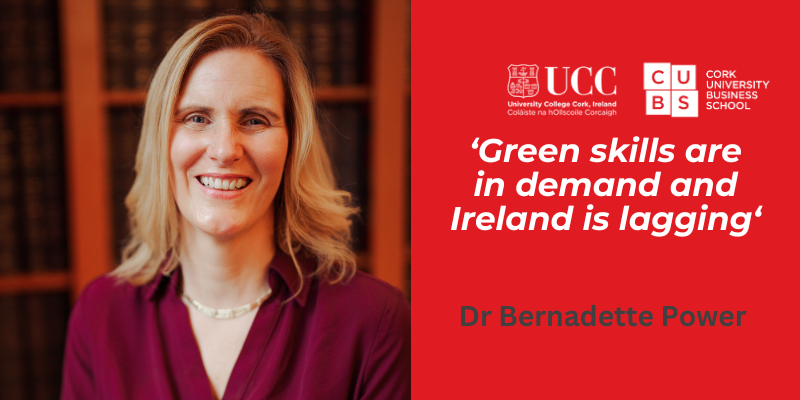
A recent LinkedIn report found that growth in demand for green skills is exceeding the increase in supply. There is no universal definition of what green skills are, however, they comprise of the skills needed to promote a green recovery and the LinkedIn report included climate related jobs in the “green skills’’ category.
According to this report, between 2022 and 2023 the median share of green talent in the workforce was 12.3%; that is 1 in 8 workers have some green skills. However, the share of green postings on LinkedIn requiring at least one green skill was 22.4% with a median growth rate of 15.2%. In Ireland, green job postings in Ireland are up 90%.
The top 10 most in-demand sustainability jobs that will play key role in the green transition, according to Sustainability Bulletin, include sustainability managers, renewable energy engineers, green building architects, environmental consultants, sustainable supply chain managers, climate change analysts, waste management specialists, water resource managers and corporate social responsibility managers.
The excess demand is good news for workers and graduates with green skills as the severe shortage of workers with the right skills means that they can demand higher wages. However, it is not great news for the green transition if the pace of adjustment in labour markets is too slow. The higher wages commanded will also increase the cost of the transition.
A significant increase in training programmes to develop green skills including undergraduate and master’s programmes as well as specialist training programmes are required to bridge this skills gap. The gap is only going to grow given the pace of transformation that needs to happen in business models and practices, supply chains and green technology adoption for a low carbon economy. Pathways to equip workers to transition into jobs to assist in this transformation are essential to meet national and global zero carbon targets. Educational programmes to build the human capital required to support businesses, communities and households in the transition are vital to address these skill shortages.
If we drill into the report, we can see that the finance industry is lagging behind other industries. Only one in 15 workers in finance were reported as having green skills. Its share of green talent is growing faster than other sectors as it catches up.This lag needs to be addressed by the finance industry as significant finance is required to enable the transition and the increased requirements on companies under the EU Corporate Sustainability Reporting Directive for environmental, social and governance reporting. This is particularly the case given the expected roll out of reporting requirements from not just large firms but also to listed SMEs. It is creating demand for skills in sustainability reporting, impact assessment and carbon and emissions accounting. While Ireland is lagging the UK and many EU countries such as Germany and Austria in this area, its year over year growth is much higher.
There will be labour market adjustments in response to the EU climate law where the EU is committed to reduce its net greenhouse gas emission by 55% by 2030. To achieve this the EU will rely more on the transition towards a circular economy, taxes on primary raw materials, extended producer responsibility, recycled content standards, subsidies for the adoption of secondary materials in addition to eco-innovation and improved product design for recyclability.
These measures will result in a reallocation of jobs with increases in sectors such as services and waste management and decreases in other sectors such as extraction and mining. By 2030, the OECD Skills Outlook Report 2023 finds that employment of blue-collar and farm workers is expected to decrease by 3% given these prospective measures under the ‘Fit for 55’ legislation and increase by 4-5% for other occupations. It should be noted that this decrease in blue-collar and farm workers employment was projected to decrease by 2% if this commitment was not in place. Thus, seeking courses which develop knowledge and skills in sustainability can shield workers and graduates from these labour market adjustments.
_____________
Dr. Bernadette Power is a lecturer in the Department of Economics, Cork University Business School (CUBS) and is the Programme Director for our new masters in International Sustainable Business .
You can register your interest in the programme here

